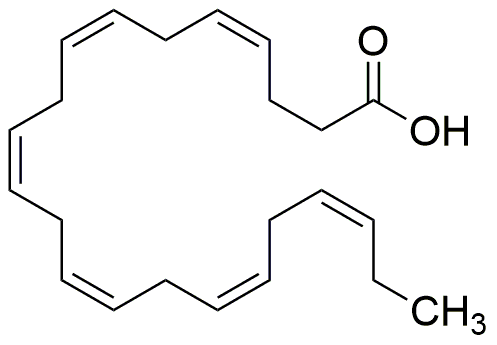cis-4,7,10,13,16,19-Docosahexaenoic acid is widely utilized in research focused on:
- Nutrition and Dietary Supplements: This compound is a key omega-3 fatty acid found in fish oil, known for its heart health benefits. It is commonly included in dietary supplements to support cardiovascular health and cognitive function.
- Pharmaceuticals: It plays a role in developing anti-inflammatory drugs. Researchers are exploring its potential to alleviate conditions like arthritis and other inflammatory diseases, providing a natural alternative to synthetic medications.
- Cosmetics and Skincare: Due to its moisturizing properties, it is used in various skincare products. Its ability to improve skin hydration and elasticity makes it popular in formulations aimed at anti-aging and skin repair.
- Food Industry: As a food additive, it enhances the nutritional profile of products. It is often added to functional foods and beverages to promote health benefits, particularly for heart and brain health.
- Animal Feed: It is incorporated into aquaculture and livestock feed to enhance the omega-3 content of animal products. This not only improves the nutritional value of meat and dairy but also supports sustainable farming practices.
General Information
Properties
Safety and Regulations
Applications
cis-4,7,10,13,16,19-Docosahexaenoic acid is widely utilized in research focused on:
- Nutrition and Dietary Supplements: This compound is a key omega-3 fatty acid found in fish oil, known for its heart health benefits. It is commonly included in dietary supplements to support cardiovascular health and cognitive function.
- Pharmaceuticals: It plays a role in developing anti-inflammatory drugs. Researchers are exploring its potential to alleviate conditions like arthritis and other inflammatory diseases, providing a natural alternative to synthetic medications.
- Cosmetics and Skincare: Due to its moisturizing properties, it is used in various skincare products. Its ability to improve skin hydration and elasticity makes it popular in formulations aimed at anti-aging and skin repair.
- Food Industry: As a food additive, it enhances the nutritional profile of products. It is often added to functional foods and beverages to promote health benefits, particularly for heart and brain health.
- Animal Feed: It is incorporated into aquaculture and livestock feed to enhance the omega-3 content of animal products. This not only improves the nutritional value of meat and dairy but also supports sustainable farming practices.
Documents
Safety Data Sheets (SDS)
The SDS provides comprehensive safety information on handling, storage, and disposal of the product.
Product Specification (PS)
The PS provides a comprehensive breakdown of the product’s properties, including chemical composition, physical state, purity, and storage requirements. It also details acceptable quality ranges and the product's intended applications.
Certificates of Analysis (COA)
Search for Certificates of Analysis (COA) by entering the products Lot Number. Lot and Batch Numbers can be found on a product’s label following the words ‘Lot’ or ‘Batch’.
Número de catálogo
Número de lote/lote
Certificates Of Origin (COO)
This COO confirms the country where the product was manufactured, and also details the materials and components used in it and whether it is derived from natural, synthetic, or other specific sources. This certificate may be required for customs, trade, and regulatory compliance.
Número de catálogo
Número de lote/lote
Safety Data Sheets (SDS)
The SDS provides comprehensive safety information on handling, storage, and disposal of the product.
DownloadProduct Specification (PS)
The PS provides a comprehensive breakdown of the product’s properties, including chemical composition, physical state, purity, and storage requirements. It also details acceptable quality ranges and the product's intended applications.
DownloadCertificates of Analysis (COA)
Search for Certificates of Analysis (COA) by entering the products Lot Number. Lot and Batch Numbers can be found on a product’s label following the words ‘Lot’ or ‘Batch’.
Número de catálogo
Número de lote/lote
Certificates Of Origin (COO)
This COO confirms the country where the product was manufactured, and also details the materials and components used in it and whether it is derived from natural, synthetic, or other specific sources. This certificate may be required for customs, trade, and regulatory compliance.


